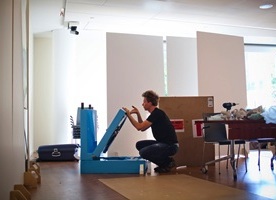 Poop in, clean water out.
Poop in, clean water out.
Bill Gates has invested more than three million dollars on behalf of the 2.6 billion people around the world who don’t have access to modern toilets. Yesterday, the three winners of his “next-generation toilet” prize were announced, showcasing innovative designs that capture and process human waste without piped water, sewer or electrical connections.
Even more impressive, the toilet prize-winners all transformed human waste into useful resources, such as energy and water, at an affordable price.
Gates announced the contest one year ago, and yesterday unveiled the three universities that will share $200,000 as winners of the Reinvent the Toilet Challenge.
- California Institute of Technology in the United States received the $100,000 first prize for designing a solar-powered toilet that generates hydrogen and electricity.
- Loughborough University in the United Kingdom won the $60,000 second place prize for a toilet that produces biological charcoal, minerals, and clean water.
- University of Toronto in Canada won the third place prize of $40,000 for a toilet that sanitizes feces and urine and recovers resources and clean water.
“If we apply creative thinking to everyday challenges, such as dealing with human waste, we can fix some of the world’s toughest problems,” said foundation Co-chair Bill Gates.
Other projects featured at the fair include better ways to empty latrines, user-centered designs for public toilet facilities, and insect-based latrines that decompose feces faster.

Unsafe methods to capture and treat human waste result in serious health problems and death. Food and water tainted with fecal matter result in 1.5 million child deaths every year. Proper toilets can also bring substantial economic benefits. According to the World Health Organization, improved sanitation delivers up to $9 in social benefits and increased economic productivity for every $1 invested.
The foundation also announced a second round of winners in the Reinvent the Toilet Challenge totaling nearly $3.4 million. The grants were awarded to teams using a variety of tools, including microwave technology to turn waste into electricity and sand filters and ultra-violet light that sanitizes feces overnight. Four winners include:
- Cranfield University This nearly $810,000 grant will help develop a prototype toilet that removes water from human waste and vaporizes it using a hand-operated vacuum pump and a unique membrane system. The remaining solids are turned into fuel that can also be used as fertilizer. The water vapor is condensed and can be used for washing, or irrigation.
- Eram Scientific Solutions Private Limited A grant of more than $450,000 will make public toilets more accessible to the urban poor via the eco-friendly and hygienic “eToilet.”
- Research Triangle Institute This $1.3 million grant will fund the development of a self-contained toilet system that disinfects liquid waste and turns solid waste into fuel or electricity through a revolutionary new biomass energy conversion unit.
- University of Colorado Boulder A nearly $780,000 grant will help develop a solar toilet that uses concentrated sunlight, directed and focused with a solar dish and concentrator, to disinfect liquid-solid waste and produce biological charcoal (biochar) that can be used as a replacement for wood charcoal or chemical fertilizers.
The Foundation has committed more than $370 million to their Water, Sanitation & Hygiene initiative.
“Imagine what’s possible if we continue to collaborate, stimulate new investment in this sector, and apply our ingenuity in the years ahead,” said Gates. “Many of these innovations will not only revolutionize sanitation in the developing world, but also help transform our dependence on traditional flush toilets in wealthy nations.”
READ more on the Bill and Melinda Gates blog, Impatient Optimists, and another post from yesterday.



















